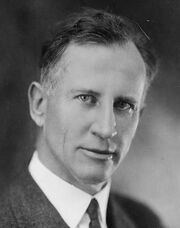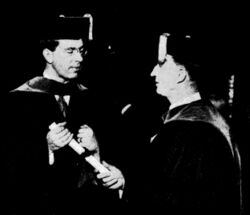Biography:Max Mason
From HandWiki
Short description: American mathematician (1877–1961)
Max Mason | |
|---|---|
 Max Mason | |
| Born | October 26, 1877 Madison, Wisconsin |
| Died | March 22, 1961 (aged 83) Claremont, California |
| Nationality | American |
| Known for |
|
| Awards | Medal for Merit 1948 |
| Scientific career | |
| Fields | mathematics |
| Institutions |
|
Charles Max Mason (26 October 1877–22 March 1961), better known as Max Mason, was an American mathematician. Mason was president of the University of Chicago (1925–1928) and the third president of the Rockefeller Foundation (1929–1936).[1][2]
Mason's mathematical research interests included differential equations, the calculus of variations, and electromagnetic theory.[3]
Education
- B.Litt., 1898, University of Wisconsin-Madison
- Ph.D., Mathematics, University of Göttingen, 1903.
- Dissertation: "Randwertaufgaben bei gewöhnlichen Differentialgleichungen" (Boundary value functions with ordinary differential equations)
- Advisor: Hilbert
Career
- Massachusetts Institute of Technology (MIT), 1903–1904, Instructor of Mathematics.
- Yale University, 1904–1908, Assistant Professor of Mathematics.
- University of Wisconsin–Madison, 1908–1909, University of Wisconsin–Madison, Associate Professor of Mathematics.
- University of Wisconsin–Madison, 1909–1925, Professor of Physics.
- National Research Council, 1917–1919, Submarine Committee. (Invented a submarine detection device, which was the basis for sonar detectors used in World War II.)
- University of Chicago, 1925–1928, President.
- Rockefeller Foundation, 1928–1929, Director, Natural Sciences Division.
- Rockefeller Foundation, 1929–1936, President.
- Palomar Observatory (California), 1936–1949, Chairman of the team directing the construction of the observatory.[4]
On 2 May 1945, he appeared on Edgar Bergen's radio show to chat about the new observatory and trade jokes with Charlie McCarthy.[5] In 1948, he, along with Lee A. DuBridge, William A. Fowler, Linus Pauling, and Bruce H. Sage, was awarded the Medal for Merit by President Harry S. Truman.[6]
Notes and references
- ↑ "Max Mason". Physics Today 14 (5): 76. May 1961. doi:10.1063/1.3057580.
- ↑ Weaver, Warren (1964). "Max Mason 1877–1961" (in en). http://www.nasonline.org/publications/biographical-memoirs/memoir-pdfs/mason-max.pdf.
- ↑ O'Connor, J. J.; Robertson, E. F. (August 2005). "Max Mason (1877 - 1961) - Biography - MacTutor History of Mathematics" (in en). http://www-history.mcs.st-andrews.ac.uk/Biographies/Mason.html.
- ↑ "Vast Hope in 'Big Eye'". The Morning Kansas City Star. Associated Press 111 (134): p. 6. 1948-06-04. https://www.newspapers.com/image/653546327.
- ↑ "Radio This Week". The Kansas City Star 68 (221): p. 11D. 1948-04-25. https://www.newspapers.com/image/655792380/.
- ↑ "Presidential Medal for Merit. February 2, 1948. - Published Papers and Official Documents - Linus Pauling and the International Peace Movement" (in en). http://scarc.library.oregonstate.edu/coll/pauling/peace/papers/1948h.1.html.
External links
- Max Mason at the Mathematics Genealogy Project
- "Max Mason" (in en). https://www.lib.uchicago.edu/projects/centcat/centcats/pres/presch04_01.html.
Archival collections
- "Guide to the Max Mason Papers 1882–1961" (in en). https://www.lib.uchicago.edu/e/scrc/findingaids/view.php?eadid=ICU.SPCL.MASONM.
- "Guide to the University of Chicago Office of the President, Mason Administration Records 1910–1929" (in en). https://www.lib.uchicago.edu/e/scrc/findingaids/view.php?eadid=ICU.SPCL.OFCPRESMASON.
- Max Mason papers, 1898-1961, Niels Bohr Library & Archives
- Max Mason papers, 1750-1815, Royal Observatory Edinburgh
- Charles Mason papers, 1750-1815, American Philosophical Society
| Academic offices | ||
|---|---|---|
| Preceded by Ernest DeWitt Burton |
President of the University of Chicago 1925–1928 |
Succeeded by Robert Maynard Hutchins |
| Non-profit organization positions | ||
| Preceded by George E. Vincent |
President of the Rockefeller Foundation 20 September 1929–30 May 1936 |
Succeeded by Raymond B. Fosdick |
 |


